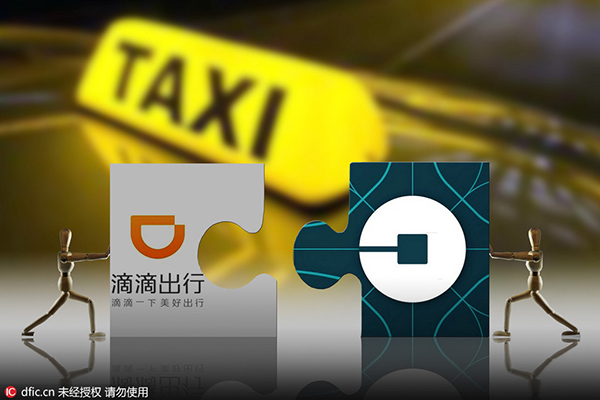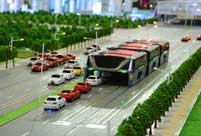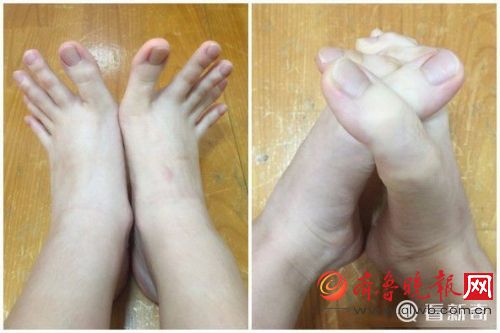

 |
| (file photo) |
“Many years later, facing streets filled with self-driving cars, you might be reminded of the afternoon that the ride-hailing company Didi Chuxing merged with Uber China,” read a post on 36Kr, a Beijing-based technology-oriented news website.
China’s leading ride-hailing app, Didi Chuxing, said on Monday that it will take over the Chinese operations of its U.S. rival, Uber, ending a ferocious battle over the Chinese market that cost both firms billions.
Together, the ride-hailing venture is worth about $35 billion, estimated the financial channel of People’s Daily Online. Uber will receive a 5.89 percent share of the combined entity, with preferred equity interest, which is equal to a 17.7 percent economic interest in Didi Chuxing, read the statement.
Although the two companies have not announced any detailed plans relating to future cooperation, self-driving and artificial intelligence algorithms are expected to be key to future operations.
On Monday, Travis Kalanick, CEO of Uber, posted on Facebook an email that he had send to his China team regarding the massive merger: “This merger paves the way for our team and Didi’s to partner on an enormous mission, and it frees up substantial resources for bold initiatives focused on the future of cities--from self-driving technology to the future of food and logistics,” wrote Kalanick.
Uber has never hidden its ambitions and excitement about a driver-free world. In February 2015, Uber, together with Carnegie Mellon University, announced the creation of the Uber Advanced Technologies Center in Pittsburgh, Pennsylvania. The center focuses on the development of key technologies in areas of mapping, vehicle safety and autonomous technology.
On May 19, Uber tested its first prototype of a self-driving car on the streets of Pittsburgh. The car, a hybrid Ford Fusion, collected mapping data at the same time as it tested its self-driving capabilities. The car was equipped with radars, laser scanners and high-resolution cameras to map the details of its environment, according to a blog post written by Uber.
Didi, too, reportedly started working on a design for a self-driving vehicle. On June 4, 2015, Didi Chuxing signed an agreement with Beijing-based BAIC Motor Corporation Co. Ltd., one of China’s leading vehicle manufactures, to cooperate on self-driving cars.
As recently as July 20, the CTO of Didi Chuxing, Zhang Bo, said at an awards ceremony in Beijing that, “self-driving [cars are] an important strategic plan for the company."
In May 2014, Apple Inc. invested $1 billion in Didi Chuxing. Didi Chuxing, in exchange, provided Apple with rich data for its own self-driving car experiments.
The massive merger came after China announced the upcoming legal status of ride-hailing apps last week, allowing qualified private cars and drivers to get involved in the business.
Under the terms of the merger, Didi Chuxing will acquire Uber China’s brand, business operations and data. Didi and Uber will also become each other's minority stockholders, and each company head will join the other's board of directors.
However, according to Bloomberg, the two companies will maintain distinct brands, apps and business operations.
Since Uber launched its China operations a little more than two years ago, both companies have spent billions of dollars subsidizing their China operations, each one vying for dominance in the potentially lucrative market. Earlier this year, Uber announced that it was losing $1 billion annually in China, and Didi was thought to be dropping similar amounts of money.
 Who Will Fit The Chinese Roles In Game Of Thrones?
Who Will Fit The Chinese Roles In Game Of Thrones? China's Hubei Shennongjia added to World Heritage List
China's Hubei Shennongjia added to World Heritage List "Straddling bus" starts production in east China
"Straddling bus" starts production in east China Girl goes viral for finger-long toes
Girl goes viral for finger-long toes Five made-in-China hi-tech breakthroughs
Five made-in-China hi-tech breakthroughs HK-Zhuhai-Macao Bridge to open to traffic
HK-Zhuhai-Macao Bridge to open to traffic China opens its first combined transport service to Nepal
China opens its first combined transport service to Nepal Students take stylish bikini graduations photos
Students take stylish bikini graduations photos Charming dancing students pose for graduation photos
Charming dancing students pose for graduation photos Top 10 livable Chinese cities
Top 10 livable Chinese cities Top 20 hottest women in the world in 2014
Top 20 hottest women in the world in 2014 Top 10 hardest languages to learn
Top 10 hardest languages to learn China’s Top 10 Unique Bridges, Highways and Roads
China’s Top 10 Unique Bridges, Highways and Roads Chinese mainland box office trips on the way to becoming world's largest
Chinese mainland box office trips on the way to becoming world's largest Sports schools used to nurture China’s medalists, but are short of students now
Sports schools used to nurture China’s medalists, but are short of students now Shutdown of news portals not aimed at restraining freedom of speech: experts
Shutdown of news portals not aimed at restraining freedom of speech: experts Sex education varies across schools
Sex education varies across schoolsDay|Week